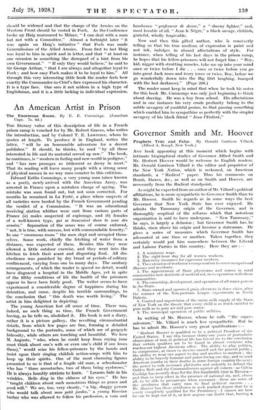A
An American Artist in Prison
rison
THE literary ,value of this description of life in a French prison camp is vouched for by Mr. Robert Graves, who writes
the introduction, and by Colonel T. E. Lawrence, whom he quotes at length. To produce it in England, writes the latter, " will be an honourable adventure for a decent publisher." It should, he thinks, be read " by all those interested in life and its material served up raw." The book, he continues, is " modern in feeling and new-world in pedigree," and " has rare passages as iridescent as decay in meat." That its reading will leave many people with a strong sense of physical nausea in no way runs counter to this criticism.
Edward Estlin Cummings, a very young man (since known as a poet), newly arrived with the American Army, was arrested in France upon a mistaken charge of spying. The mistake was soon found out, but not soon corrected. For months lie remained in La Ferte, a place where suspects of all varieties were herded by the French Government pending the verdict of a Commission. " It was an educational receivini" station whither were sent from various parts of France (a) males suspected of espionage, and (b) females of a well-known type, qui se trouraient dans la zone des armies." Separation of the sexes was of course enforced, " not, it is true, with success, but with commendable ferocity." In one " enormous room " the men slept and occupied them- selves. Some work, chiefly the fetching of water from a distance, was expected of them. Besides this they were allowed a little outdoor exercise, and they went into the kitchen to fetch their scant and disgusting food. All dis- obedience was punished by dry bread or periods of solitary confinement, varying from one to many days. The sanitary arrangements, of which the reader is spared no detail, would have disgraced a hospital in the Middle Ages, yet in spite of the filthy conditions of life the health of the prisoners appear to have been fairly good. The writer seems to have experienced a considerable degree of happiness during his detention, and came, despite his terrible surroundings, to the conclusion that " this death was worth living." The artist in him delighted in depicting.
The young American lost all sense of time. There was, indeed, no such thing as time, the French Government having, as he tells us, abolished it. His book is not a diary, rather it is a picture gallery, the revolting circumstantial details, from which few pages are free, forming a detailed background to the portraits, some of which are of gargoyle hideosity, while others are touching and beautiful. We love
M. Auguste, " who, when he could keep from crying (one must think about one's wife or even one's child if one loves them)," would seize his fellow-prisoners by the hands and insist upon their singing childish action-songs with him to keep up their spirits. One of the most charming figures presented to us is that of a fragile old man, a schoolmaster who has " three moustaches, two of them being eyebrows."
He is always humbly anxious to learn. " Lessons hide in his wrinkles. Bells ding in the oldness of his eyes." He has " taught children about such monstrous things as peace and good witl." We see, too, very clearly, " a big, shaggy person who would talk about mon petit jardin," a young Russian barber who was allowed -to follow his profession, a vain and handsome " professeur de dense," a " sheeny fighter." and, most lovable of all, " Jean le Negre," a black savage, childish, grateful, wholly forgivable.
Now and then this gifted author, who is constantly telling us that his true medium of expression is paint and not ink, indulges in absurd affectations of style. For instance, when telling of his last days in the prison camp, he hopes that his fellow-prisoners will not forget him : " Boy, kid, nigger with strutting muscles, take me up into your mind once or twice before I die . . . once or twice before you go into great Jack roses and ivory (once or twice, Boy, before we go wonderfully down into the Big Dirt laughing, bumped with the last darkness)." (Page 296.)
The reader must keep in mind that when he took his notes for this book Mr. Cummings was only just beginning to think about shaving. He was a boy from school. His affectations and in one instance his very crude profanity belong to the subtle savagery of youthful genius, to that passing something which enabled him to sympathize so perfectly with the simpler savagery of his black friend " Jean l'Enfant."




































 Previous page
Previous page